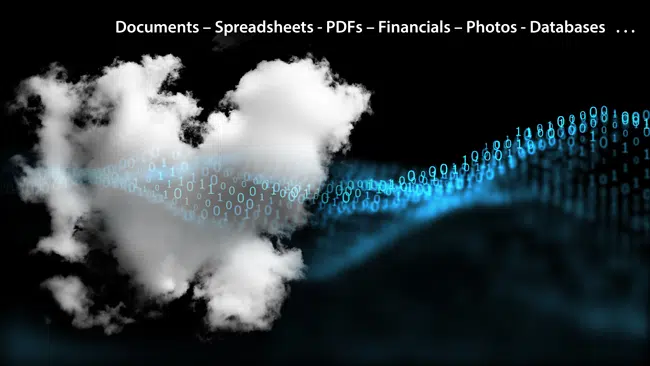Over the years, we’ve seen an increase in businesses and individuals migrating data to the cloud. This means data created on smartphones, Windows and Mac computers, and email accounts are stored “in the cloud”. Individuals and businesses often sync their data across devices to access it anytime and anywhere. Thus, litigators must look beyond specific devices like phones and computers, and look into cloud accounts.

While creating a Discovery Protocol and defining the evidence you need, consider online cloud accounts and online backups. See below for examples of the most common cloud online accounts used by individuals and businesses.
Fast & Cost-Effective
Fast turn-around and transparent flat-fee pricing.
The flat-fee services are all-inclusive. Therefore, we don’t charge for phone calls, emails, meetings, or hard drives to store the data.
Collection of Cloud Online Data and Information
At Howe Law Firm, we provide a defensible collection of cloud accounts. Because this tends to generate large troves of data, we also cull the data to provide only the information you need. You can avoid the risk of sanctions from “self-collection” by using a third-party expert like us to do the collection, instead of your client or law firm staff. After all, you never want to put your client or staff on the witness stand to defend the collection practices in a discovery dispute.
When collecting cloud data, consider online backups. Backups are helpful when data has intentionally, or inadvertently, been deleted.
Finally, you avoid the risk of sanctions from “self-collection” by using a third-party cloud forensic expert like us to do the collection. It’s preferable to use third parties for evidence collection, as opposed to your own client or law firm staff. After all, you never want to put your client or staff on the witness stand to defend the collection practices in a discovery dispute.
Cloud Accounts Forensics
With our cloud forensics tools, we handle the collection, preservation, and production of your digital evidence. We conduct our forensics remotely so you or your client can keep possession of your electronic device whether it’s a laptop, desktop, tablet, or smartphone.
Preservation and Litigation Hold of Cloud Online Data and Information
At the “anticipation of litigation,” your client has a duty to preserve evidence. The best practice is notifying the opposing party with a “Preservation Notice” or “Litigation Hold” letter or email. This puts them on notice to preserve potentially relevant information, including online cloud data.
Review of Cloud Online Data and Information
After collection and preservation, we provide Excel Evidence Reports for quick, easy, and cost-effective legal review of cloud online data and information. We also provide you access to the most important evidence in a timely manner while helping you quickly cull non-responsive items.
Production of Cloud Online Data and Information
At Howe Law Firm, we help you create productions of cloud online data and information as in any other data type (e.g. computer files, emails, and text messages). We provide productions as you like (e.g. native file format) and Privilege Logs.
Individual Cloud Online Accounts
If your case involves an individual (e.g. Family Law or Employment Law), in addition to collecting electronically stored information (ESI) from the mobile phone, Windows or Mac computer, and email account, consider the following common cloud online data storage providers:
- Dropbox
- Google Drive
- Microsoft OneDrive
- iCloud
- Amazon Drive
- Box
- Carbonite
- ElephantDrive
- justcloud
- Mozy
- OpenDrive
- SugarSync
- Mega
- pCloud
- Mediafire
- FlipDrive
- HiDrive
- hubiC
- SpiderOak
- 4shared
- Tresorit
- Syncplicity
- PowerFolder
- CloudMe
Business Cloud Online Accounts
If your case involves a business (e.g. business litigation, intellectual property, employment claim, partnership and shareholder litigation, and products liability), in addition to collecting electronically stored information (ESI) from mobile phones, servers, Windows or Mac computers, and email accounts, consider the following cloud online data storage providers:
